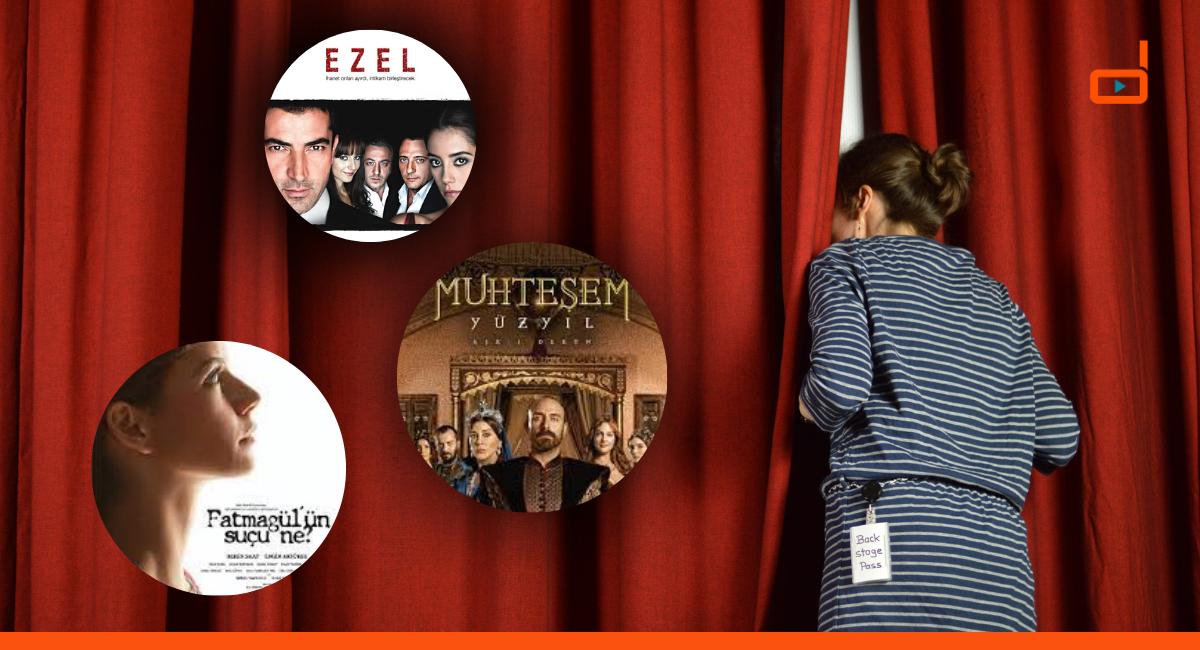Behind the Scenes: How Turkish TV Series Are Produced

Conceptualization and Scriptwriting
A Turkish series begins with a resonant concept, combining drama, romance, history, and culture. Writers and producers create a unique storyline through meticulous research, ensuring narrative authenticity. For example the series “Fatmagül’ü Suçu Ne?” adeptly navigates complex themes of justice, resilience, and societal norms, all wrapped within a compelling narrative.
These series intrigue Eastern viewers with a modern lifestyle uncommon in their own countries, Turkish TV series are a good example of the blending of Eastern and Western cultures.
Casting and Character Development
Casting directors meticulously select actors who embody roles’ essence, resulting in well-rounded characters. Actors invest time in understanding roles and delivering authentic performances that resonate with viewers.
In previous years, movie and theatre actors starred in TV series. The 2000s shifted the trend, introducing new faces and diverse subjects, captivating audiences.
Costume and Makeup Artistry
Locations and Sets
Post-Production and Editing
Editors weave cohesive storylines from hours of footage, while visual effects enhance scenes, especially in historical dramas. Turkish musical instruments and motifs are incorporated into the soundtrack to match the historical period and theme of the series.
Embracing Challenges with Innovation
In the dynamic world of TV production, challenges like tight schedules and budgets pave the way for ingenious solutions. We harness cutting-edge technology for mesmerizing visual effects and foster international co-productions, shaping a truly remarkable viewing experience.
Global Reach and Future Prospects
Turkish series’ success drives international collaborations, exploring new genres, formats, and platforms to meet global demand.
An excellent example of this is the series called “Ezel” which served as a major milestone in Turkish television’s global recognition. This paved the way for other Turkish series to become popular around the world. The success of “Ezel” showed that there is an increasing demand for high-quality storytelling and well-made productions that can cross linguistic and cultural barriers.
Conceptualization and Scriptwriting
A Turkish series begins with a resonant concept, combining drama, romance, history, and culture. Writers and producers create a unique storyline through meticulous research, ensuring narrative authenticity. For example the series “Fatmagül’ü Suçu Ne?” adeptly navigates complex themes of justice, resilience, and societal norms, all wrapped within a compelling narrative.
These series intrigue Eastern viewers with a modern lifestyle uncommon in their own countries, Turkish TV series are a good example of the blending of Eastern and Western cultures.
Casting and Character Development
Casting directors meticulously select actors who embody roles’ essence, resulting in well-rounded characters. Actors invest time in understanding roles and delivering authentic performances that resonate with viewers.
In previous years, movie and theatre actors starred in TV series. The 2000s shifted the trend, introducing new faces and diverse subjects, captivating audiences.
Costume and Makeup Artistry
Locations and Sets
Post-Production and Editing
Editors weave cohesive storylines from hours of footage, while visual effects enhance scenes, especially in historical dramas. Turkish musical instruments and motifs are incorporated into the soundtrack to match the historical period and theme of the series.
Embracing Challenges with Innovation
In the dynamic world of TV production, challenges like tight schedules and budgets pave the way for ingenious solutions. We harness cutting-edge technology for mesmerizing visual effects and foster international co-productions, shaping a truly remarkable viewing experience.
Global Reach and Future Prospects
Turkish series’ success drives international collaborations, exploring new genres, formats, and platforms to meet global demand.
An excellent example of this is the series called “Ezel” which served as a major milestone in Turkish television’s global recognition. This paved the way for other Turkish series to become popular around the world. The success of “Ezel” showed that there is an increasing demand for high-quality storytelling and well-made productions that can cross linguistic and cultural barriers.
Behind the Scenes: How Turkish TV Series Are Produced

Conceptualization and Scriptwriting
A Turkish series begins with a resonant concept, combining drama, romance, history, and culture. Writers and producers create a unique storyline through meticulous research, ensuring narrative authenticity. For example the series “Fatmagül’ü Suçu Ne?” adeptly navigates complex themes of justice, resilience, and societal norms, all wrapped within a compelling narrative.
These series intrigue Eastern viewers with a modern lifestyle uncommon in their own countries, Turkish TV series are a good example of the blending of Eastern and Western cultures.
Casting and Character Development
Casting directors meticulously select actors who embody roles’ essence, resulting in well-rounded characters. Actors invest time in understanding roles and delivering authentic performances that resonate with viewers.
In previous years, movie and theatre actors starred in TV series. The 2000s shifted the trend, introducing new faces and diverse subjects, captivating audiences.
Costume and Makeup Artistry
Locations and Sets
Post-Production and Editing
Editors weave cohesive storylines from hours of footage, while visual effects enhance scenes, especially in historical dramas. Turkish musical instruments and motifs are incorporated into the soundtrack to match the historical period and theme of the series.
Embracing Challenges with Innovation
In the dynamic world of TV production, challenges like tight schedules and budgets pave the way for ingenious solutions. We harness cutting-edge technology for mesmerizing visual effects and foster international co-productions, shaping a truly remarkable viewing experience.
Global Reach and Future Prospects
Turkish series’ success drives international collaborations, exploring new genres, formats, and platforms to meet global demand.
An excellent example of this is the series called “Ezel” which served as a major milestone in Turkish television’s global recognition. This paved the way for other Turkish series to become popular around the world. The success of “Ezel” showed that there is an increasing demand for high-quality storytelling and well-made productions that can cross linguistic and cultural barriers.

